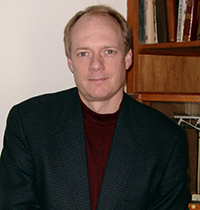Professor Timothy Swager, Massachusetts Institute of Technology
Professor Timothy Swager will be giving 2 lectures during his upcoming visit to the University of Florida:
January 15, 2013 - Leigh 309 - 12:00pm
"Synthesis of Polycyclic Aromatics for use as High Performance Electronic Materials"
January 16, 2013 - Weimer 1065 - 4:05pm
"Molecular Electronics for Chemical Sensors"
 Timothy M. Swager is the John D. MacArthur Professor of Chemistry at the Massachusetts Institute of Technology. A native of Montana, he received a BS from Montana State University in 1983 and a Ph.D. from the California Institute of Technology in 1988. After a postdoctoral appointment at MIT he was on the chemistry faculty at the University of Pennsylvania and returned to MIT in of 1996 as a Professor of Chemistry and served as the Head of Chemistry from 2005-2010. He has published more than 300 peer-reviewed papers and 48 issued/pending patents. Swager's honors include: The John Scott Award, Election to the National Academy of Sciences, an Honorary Doctorate from Montana State University, the Lemelson-MIT Award for Invention and Innovation, Election to the American Academy of Arts and Sciences, the Christopher Columbus Foundation Homeland Security Award, and The Carl S. Marvel Creative Polymer Chemistry Award (ACS). Timothy M. Swager is the John D. MacArthur Professor of Chemistry at the Massachusetts Institute of Technology. A native of Montana, he received a BS from Montana State University in 1983 and a Ph.D. from the California Institute of Technology in 1988. After a postdoctoral appointment at MIT he was on the chemistry faculty at the University of Pennsylvania and returned to MIT in of 1996 as a Professor of Chemistry and served as the Head of Chemistry from 2005-2010. He has published more than 300 peer-reviewed papers and 48 issued/pending patents. Swager's honors include: The John Scott Award, Election to the National Academy of Sciences, an Honorary Doctorate from Montana State University, the Lemelson-MIT Award for Invention and Innovation, Election to the American Academy of Arts and Sciences, the Christopher Columbus Foundation Homeland Security Award, and The Carl S. Marvel Creative Polymer Chemistry Award (ACS).
Swager's research interests are in design, synthesis, and study of organic-based electronic, sensory, high-strength and liquid crystalline materials. In the field of liquid crystals he developed new designs based upon shape complementarity to generate specific interactions between molecules and has recently developed fundamental mechanisms for increasing the order in liquid crystals by a new mechanism referred to as minimization of free volume. Swager's research in electronic polymers has been mainly directed at the demonstration of new conceptual approaches to the construction of sensory materials. These methods are the basis of the FidoTM explosives detectors (FLIR Systems Inc), which have the highest sensitivity of any explosives sensor. Other areas actively investigated by the Swager group include radicals for dynamic nuclear polarization, applications of nano-carbon materials, organic photovoltaic materials, polymer actuators, and luminescent molecular probes for medical diagnostics.
Synthesis of Polycyclic Aromatics for use as High Performance Electronic Materials
Aromatic rings are fundamental building blocks of most organic electronic materials, including electronic polymers, graphenes, and carbon nanotubes. The rigidity, stability, and delocalization provided by these structures are indispensible elements of any organic electronic material design. This lecture will focus on a number of synthetic methods that can be used to synthesize low molar mass materials and be applied to larger entities, including polymers and nanomaterials. Approaches will include oxidative cyclizations that produce new C-C and C-O linkages. Alkynes will be highlighted as useful elements of unsaturation and methods to convert these into fused aromatic systems will be presented. Electrocyclic reactions are also of interest and both traditional (Diels-Alder) and organometallic processes will be demonstrated in the synthesis of extended polycyclic aromatic structures.
Molecular Electronics for Chemical Sensors
This lecture will detail the creation of ultrasensitive sensors based on electronically active conjugated polymers (CPs) and carbon nanotubes (CNTs). A central concept that a single nano- or molecular-wire spanning between two electrodes would create an exceptional sensor if binding of a molecule of interest to it would block all electronic transport. The use of molecular electronic circuits to give signal gain is not limited to electrical transport and CP-based fluorescent sensors can provide untratrace detection of chemical vapors via amplification resulting from exciton migration. Nanowire networks of CNTs provide for a practical approximation to the single nanowire scheme. New methods for fabrication using solventless deposition methods will be described that allow for economical flexible sensor fabrication. These methods include abrasion deposition and selectivity is generated by covalent and/or non-covalent binding selectors/receptors to the carbon nanotubes. Sensors for a variety of materials and cross-reactive sensor arrays will be described. The use of carbon nanotube based gas sensors for the detection of ethylene and other gases relevant to agricultural and food production/storage/transportation are being specifically targeted and can be used to create systems that increase production, manage inventories, and minimize losses. |